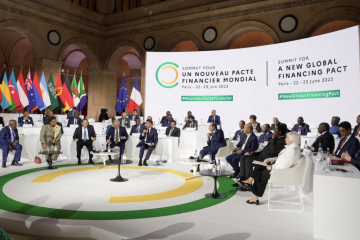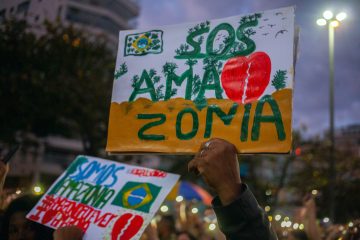
Trump has compromised climate security strategies
Much has been said about the global environmental, economic and leadership consequences of United States President Donald Trump’s decision to withdraw from the Paris climate agreement but there is also a national security dimension. Trump’s decision ignores an important development in global security centred on climate change. The US had been in a prime position to link climate to international security which, rightly or wrongly, could be leveraged for foreign policy in pursuit of climate security. The US has been a leader in climate security, an approach rivalling climate justice reasoning in climate politics. For much of the history of international climate politics, there has been a dominant discourse of climate justice. Early environmental conferences focused on planetary justice and …

The Paris Climate Summit: A Milestone for the Global South?
International summits are vital to promoting global agreement and laying the groundwork for future international cooperation. The Summit for a New Global Financial Pact took place in Paris, co-hosted by France’s President Emmanuel Macron and Barbados’ Prime Minister Mia Mottley. The Summit, organised with the aim of promoting global unity for international financial architecture form, set out to achieve four main goals focusing on fiscal sustainability and climate change in low-income countries. Amid the worldwide increase in extreme poverty and climate disasters, these conferences provide a platform for building coalitions to resolve urgent humanitarian issues. However, there has been a marked decline in international cooperation and the success of these events. In 2022, the United Nations Climate Change Conference COP27 …

From periphery to core: COP27 and the era of loss and damage
“Already at 1.1-degrees of warming, we are living in an era of unmanageable loss and damage. We on the frontlines are paying the price for decades of wholly insufficient action by those most responsible for the dangerous state of our climate.” (AOSIS’ opening statement at COP27) At the outset of the 27th Conference of the Parties (COP) to the United Nations Framework Convention on Climate Change (UNFCCC), the Alliance of Small Island States (AOSIS) made clear what they wanted to get out of this gathering under the hot November sun of Sharm el-Sheikh. They would not leave Egypt without an acceptable agreement that would reflect their decades long struggle for financial support on loss and damage. And, against all odds, …

Brazil is back: Will Lula Manage to Rebuild Brazil’s Environmental Policy?
Lula signalled new winds for Brazilian climate politics in his victory speech after winning the presidential election. In his words: “Brazil is ready to retake its leadership in the fight against the climate crisis, by protecting all its biomass, especially the Amazon rainforest”. During Lula’s first presidential mandate at the beginning of the 2000s, Brazil, and other countries led by progressive leaders across Latin America, expanded mega extractive projects to fund their distributive politics. These projects are responsible for environmental degradation and threats to local people’s health and lives until this day. However, Lula also has also great achievements. Between 2005 and 2012, Brazil registered the lowest illegal deforestation in the Amazon as a result of the implementation of the …
Within the EU, Redistributive CAP Mechanisms Can Make a Big Difference for Small Farms
The proverbial thunderclouds are finally dispersing over the fields and farms of Europe. The protracted negotiations over the European Union’s next Common Agricultural Policy (CAP) budget, which began in 2018, finally concluded in June with a provisional agreement between the EU’s Commission, Council, and Parliament. While the storm is not officially over – Parliament must ratify the deal in the coming autumn – the warring factions have retreated to lick their wounds for the time being, with both environmentalists and small farmers frustrated that the final proposals either did not address their demands or did so in a watered-down fashion. Of particular concern to small farmers’ groups is the mandatory implementation of policies designed to redistribute CAP funds and level …

What China’s Falling Rocket Tells Us About the Increasing Orbital Space Debris Problem
In early May, the international community held its breath as China’s Long March 5B rocket plummeted uncontrollably back to earth. While the debris landed safely in the Indian Ocean, silencing concerns about a potentially dangerous impact, the increasing frequency of uncontrolled re-entries highlights the importance of state responsibility in safely disposing of space debris. This is not the first time China neglected to dispose properly of its orbital debris. A similar incident occurred this time last year when an out-of-control Chinese rocket–and the largest human-made object ever to return to earth uncontrolled from space–dropped debris on Cote d’Ivoire and in the Atlantic Ocean. While most debris disintegrates upon atmospheric re-entry, some components with higher melting points can persist and penetrate …
Impacts of the COVID-19 Pandemic on the Water-Energy-Food Nexus
In a recently published journal article, we argue that there is a pressing need for a systemisation of the impacts of COVID-19 on water, energy and food security. We also explore the tangible impacts of the pandemic, including negative aspects, like increase in medical waste, and positive aspects, like some improvements in air quality and carbon emissions. The COVID-19 pandemic offers an opportunity to examine the impacts of system-wide crises on key supply sectors, such as water, energy, and food. These sectors are becoming increasingly interlinked in environmental policy-making and with regard to achieving supply security. Now, there is a pressing need for a systematization of impacts and responses beyond the disruptions on individual supply sectors. Specifically, this paper provides …
What if We Talked about Foreign Policy? Italy’s Opportunities for Global Leadership in 2021
After the Cold War and the fall of the First Italian Republic, Italy struggled to formulate a coherent foreign policy strategy. Generally, foreign policies at global level during the Cold War era were dictated by the bipolar relationship between the United States and the Soviet Union. Italian foreign policy, therefore, was a function of the United States’ sphere of influence and interests, and Italy was often a bridge and interlocutor for the Americans to the Middle East or Eastern Europe. With the collapse of the bipolar system and the disintegration of the major Italian political parties that were the core political actors in the aftermath of World War Two, Italian foreign policy was partially dictated by individual figures and was …
Plastic Pollution is Outpacing our Ability to Manage It
Actors around the world have taken up increasingly ambitious strategies to tackle plastic pollution: public-private partnerships like the Circulate Capital Ocean Fund; European Union strategies like banning commonly used- single-use products; and large international conferences like Our Oceans. Still, plastic waste remains a tangible and prominent environmental issue. Policymakers are wondering if the current spate of solutions will be enough to bring us to mitigate plastic waste effectively. In this article, I will examine how much and what kind of effort would be needed to significantly reduce plastic pollution emissions. I leveraged research from The Plastic Pollution Emissions Working Group (PPEG). The PPEG—a team of scientists, policy wonks, and practitioners working together under a grant from the National Socio-Environmental Synthesis …









